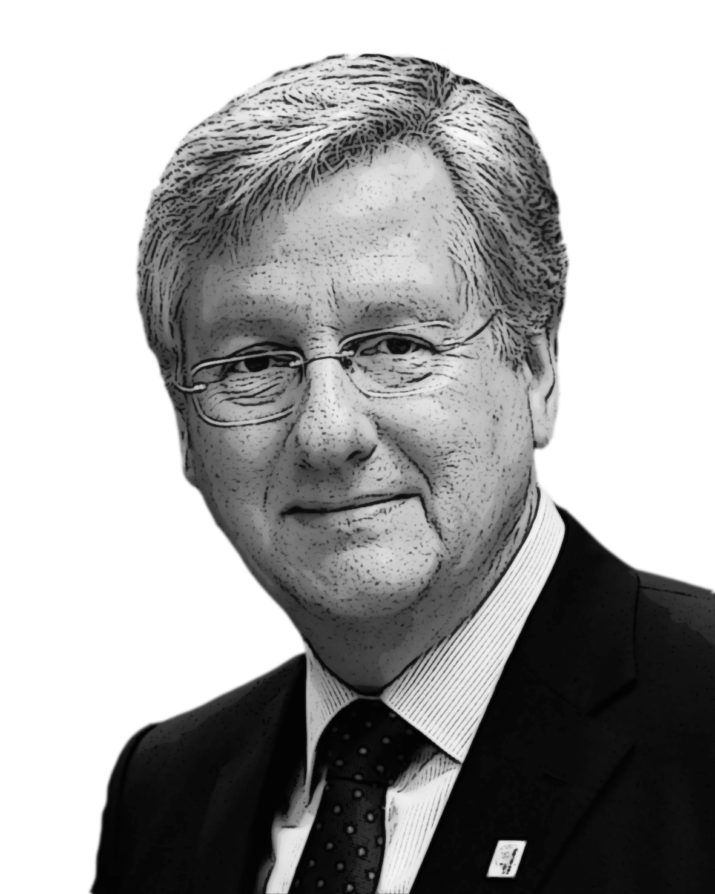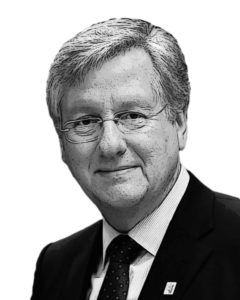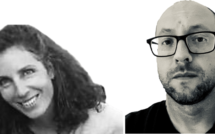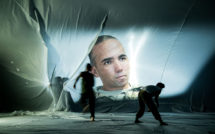

This is part of our special feature on Sustainability & Innovation.
On April 13, I had the great pleasure and privilege to meet Hans-Jochen Schiewer at the German Consulate in New York, and to interview him during his brief visit. Hans-Jochen Schiewer was elected the first president of a European university, a historical alliance that celebrated the opening of “Eucor – The European Campus” at the Palais universitaire in Strasbourg on May 11, 2016. In light of this edition, what better way of celebrating collaboration and innovation than with a first European Campus that communicates “Fives Voices, Three Countries,” yet “One Goal” in a very dynamic and inspiring way of shaping a Europe of tomorrow.
—Nicole Shea for EuropeNow
EuropeNow What is Eucor?
Hans-Jochen Schiewer “Eucor – The European Campus” is a cooperative of Upper Rhine universities, that is, the Universities of Basel in Switzerland, Haute-Alsace and Strasbourg in France, and Freiburg in Germany, as well as the Karlsruhe Institute of Technology. These institutions of higher education began cooperating in 1989, and decided in 2012 that they would become a legal entity, a European legal entity that materialized in 2016 when they were acknowledged as such. This vision of the crystallization of cross-border science and research has been awarded an implementation grant from the European Union to set the framework conditions for future innovations in research and pedagogy, and to fund the necessary structural measures. I, personally, see these groundbreaking new partnerships as Eucor’s starting point for becoming the first real European University in the next decade.
EuropeNow What are the short- and long-term goals?
Hans-Jochen Schiewer The short-term goal is to secure further funding from the European Union for the 2016-2018 time frame to develop new structures and strategies for collaboration and cooperation. The long-term goal of our cross-border university alliance focuses on innovation and transformation. We do not wish only to harmonize old structures; instead, we wish to implement joint professorships and share administrative personnel between the five universities, as well as to enlarge our portfolio in specific disciplines. We are also looking to establish even more triple degree programs between Switzerland, France, and Germany, which would allow all of our doctoral students to be supervised by colleagues at any of the five partner universities. In addition, we will combine forces to reorganize our core facilities and technical platforms. For example, we are planning to implement a search engine on our website that allows students to search courses and studies at all five universities at one time. All students will hereby have access to the whole offer of the European Campus with just a few clicks on one website.
Furthermore, the universities of Eucor – The European Campus are part of the project to implant a large-scale research infrastructure in the Upper Rhine region. The aim is to use synergies and to offer one of the best conditions in terms of laboratories and equipment for researchers in Europe.
EuropeNow What are some current research foci?
Hans-Jochen Schiewer That is a very important question since we want to become stronger in our research and achieve greater global visibility by combining forces in specific areas. In the field of life sciences, for instance, we already have a strong triangle between Basel, Strasbourg, and Freiburg, but, in the field of material science, such as applied materials and adaptive materials, our university alliance of Strasbourg, Karlsruhe, and Freiburg is renowned. We are also very much involved in microsystems engineering with a stronghold in Freiburg, and are working in all the above mentioned areas, life sciences, material science, and microsystems engineering, with some strong local industry partners in Basel, in the region outside Baden Wuertemberg and outside the Upper Rhine campus. The Upper Rhine valley, in fact, is a strong hub for microsystems engineering. However, we are also working in other prominent areas, such as civil security, and are very lucky to combine the broad portfolio of disciplines from three comprehensive universities: Basel, Strasbourg, and Freiburg. In other words, we can cover the field of civil security not only in terms of engineering or technology, but also in behavioral science, social sciences, and law, which allows us to have a future impact on the welfare state, democracy and the technical standards alongside the legal system in that specific country or in the EU.
EuropeNow What can we learn from the trinational NeuroCampus project?
Hans-Jochen Schiewer The trinational NeuroCampus—Neurex—is one of our traditional projects with a significant history that already serves as a role model for future initiatives. Combining the forces of a specific discipline or specific area, such as neuroscience, broadens our competencies, strengthens our research findings, and increases our international visibility through co-authored publications. Most importantly, however, the success of Neurex will serve as a role model for other initiatives, such as in life sciences, material science, and other high-profile areas.
EuropeNow How interdisciplinary do you envision projects to be?
Hans-Jochen Schiewer We have been fostering interdisciplinary initiatives and research for decades and are using the University of Freiburg as a role model. Currently, our twenty interdisciplinary research centers promote areas like translational cell research, medieval studies, and sustainability studies, among others. In addition, we have well-known collaborative research centers funded by the German Research Foundation in disciplines within the university and beyond through cooperative agreements with the Max Plank Society and the Fraunhofer Society for the Advancement of Applied Research. Freiburg is the center of Fraunhofer in Germany, which allows us to build a bridge between basic research, which is done at the University or at the European campus level, and applied research at the Fraunhofer Society until industrial readiness has been achieved. Fraunhofer, in fact, operates in close cooperation with industries and is earning more than 65 percent of their budget through contract work.
EuropeNow The overarching cluster for the Sustainability initiative is “Governance of sustainable growth,” which was initiated in 2016. Can you recall some of the achievements during the initial year?
Hans-Jochen Schiewer The achievements are not as visible as they could be, but this initial year has been used for mapping sustainability science initiatives in the Upper Rhine Valley, both at the member institutions of the European Campus and at other institutions with sustainability at their core, such as the Institute for Wine Research. Mapping allows us to see which institutions in the Upper Rhine Valley are concerned with sustainability and build consortia between respective institutions which, in the long run, allows us to apply for funding at the EU level.
EuropeNow Could you envision a platform like EuropeNow to make scientific findings accessible to a large academic and global audience?
Hans-Jochen Schiewer Of course, I would like to envision that. This is actually one of the biggest challenges: how do we transfer the knowledge gathered within the research universities to benefit society? How can we make our research accessible? I am convinced that EuropeNow is a brilliant platform to do so, since it not only features the latest research, but it also combines research with new publications, literature, arts, and culture, which makes the journal so attractive. From the journal, you draw people to the EuropeNow website to read about new publications, history, and European politics, as well as to the interesting research done at the CES’ member institutions. Overall, EuropeNow could be the key for member institutions to become more popular and visible.
EuropeNow Who is deciding on the research foci of the consortium, such as SERIOR? Are students and professors involved in the planning?
Hans-Jochen Schiewer It really all depends on who has the best idea. If a student comes up with an innovative project, then we will work with the student just like we would with a professor. Normally, projects are started by post-docs or professors, however, and they are shared with students via innovative pedagogy, thereby linking research and teaching. New ideas get discussed in the classroom for students to refine those ideas, and to get involved in research projects from the beginning. In this way, we are working outside the traditional hierarchical boundaries, and are open-minded and student-focused instead.
EuropeNow How will Eucor impact careers and increase career opportunities?
Hans-Jochen Schiewer While we have our career and talent management systems at our partnering universities in place, we are now working on the structural framework that will allow us to combine those institutions, forces, and management systems. In this way, all of our participating young students, doctoral candidates, and post-docs have a much better chance to explore the employment markets in Switzerland, France, and Germany, and can easily see if employment opportunities are perhaps greater in one of the cooperating countries. Eucor students are provided not only with the opportunity of cross-border education, but also with cross-border mindsets and employment perspectives. I really see a better chance for the future of our young doctoral students and post-docs as well. To support our students and young researchers, we also offer workshops about the trinational job market and the application process in the different countries – one of the most important aspects will though be that all of them already have a network through their intercultural studies and researches. That is why, we can proudly say, that studies and researches at the European Campus are predestined to build up a very successful international career.
Prof. Dr. Dr. h.c. Hans-Jochen Schiewer, born in 1955, completed his studies in German Language and Literature and History in 1983. He completed his doctorate in German Philology at the Free University of Berlin in 1990 and habilitated in 1998. After having worked at the Free University of Berlin and at Wadham College, University of Oxford, he became full professor for Medieval German Philology in Göttingen (2001–2003) and in Freiburg (since 2003). He holds a honorary doctorate from the University of Latvia (since 2011) and from the Université de Strasbourg (since 2016). In 2012 he was appointed “Commandeur” of the French “Ordre des Palmes Académiques”. Since 2008 Hans-Jochen Schiewer has been rector of the University of Freiburg. Hans-Jochen Schiewer has been President of EUCOR – The European Campus since 2013.
Nicole Shea is the Director of the Council for European Studies and Executive Editor of EuropeNow.
Photo: Prof. Dr. Dr. h.c. Hans-Jochen Schiewer, Private
Published on June 6, 2017.




